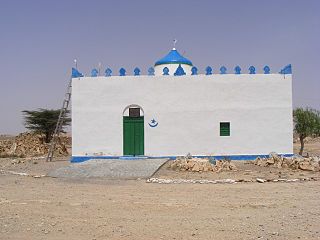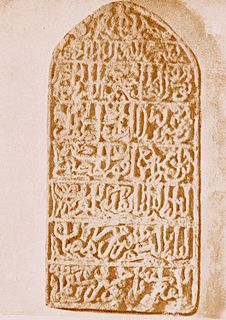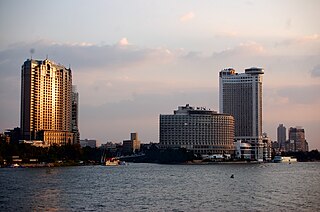Sheikh —also transliterated Sheik, Shykh, Shayk, Shaykh, Cheikh, Shekh, and Shaikh—is an honorific title in the Arabic language. It commonly designates the ruler of a tribe, who inherited the title from his father. "Sheikh" is given to a royal male at birth and the related title "Sheikha" is given to a royal female at birth.

The culture of Somalia is an amalgamation of traditions in that were developed independently since the proto-Somali era through interaction with neighboring and far away civilizations, including other parts of Africa, the Arabian Peninsula, and Indian subcontinent. The hypernym of the term Somali from a geopolitical sense is Horner and from a ethnic sense, it is Cushite.
The Osmanya alphabet, also known as Far Soomaali and, in Arabic, as al-kitābah al-ʿuthmānīyah, is a writing script created to transcribe the Somali language. It was invented between 1920 and 1922 by Osman Yusuf Kenadid, the son of Sultan Yusuf Ali Kenadid and brother of Sultan Ali Yusuf Kenadid of the Sultanate of Hobyo.

The Darod is a Somali clan. The forefather of this clan was Abdirahman bin Isma'il al-Jabarti, more commonly known as Darood. The Darod clan is the largest Somali clan in the Horn of Africa, with a wide traditional territory.
Abd al-Rahman al-Jabarti (853–921), full name: Abd al-Rahman bin Hasan bin Burhan al-Din al-Jabarti, often simply known as Al-Jabarti, was an Egyptian scholar of Somali descent and chronicler who spent most of his life in Cairo.
The Jeberti are a Muslim clan inhabiting the Horn of Africa and Middle East, mainly Somalia, Ethiopia, Djibouti, Eritrea and Yemen.

Wadaad writing, also known as wadaad Arabic, is the traditional Somali adaptation of written Arabic, as well as the Arabic script as historically used to transcribe the Somali language. Originally, it referred to an ungrammatical Arabic featuring some words in Somali, with the proportion of Somali vocabulary terms varying depending on the context. Alongside standard Arabic, wadaad writing was used by Somali religious men (wadaado) to record xeer petitions and to write qasidas. It was also used by merchants for business and letter writing. Over the years, various Somali scholars improved and altered the use of the Arabic script for conveying Somali. This culminated in the 1950s with the Galal alphabet, which substantially modified letter values and introduced new letters for vowels.
Mohammed Uthman al-Mirghani, known as Al-Khatim, was the founder of the Khatmiyya sufi tariqa that has a following in Egypt, Sudan, Eritrea, Somalia and Ethiopia.

The Khatmiyya is a Sufi order or tariqa founded by Sayyid Mohammed Uthman al-Mirghani al-Khatim. The Khatmiyya is the largest Sufi order in Sudan, Eritrea and Ethiopia. It also has followers in Egypt, Chad, Saudi Arabia, Somalia, Uganda, Yemen and India.
Abdirahman bin Isma'il al-Jabarti,(Arabic:عبدالرحمن بن اسماعيل الجبرتي) also known as Darod,(Arabic:دارود) Dawud or Da'ud, is the common ancestor of the Somali and Omani Darod clan. According to early Islamic books and local tradition, Abdirahman descended from Aqeel ibn Abi Talib, a member of the Banu Hashim and the cousin of the Islamic prophet Muhammad.
Hassan al-Jabarti was a Somali mathematician, theologian, astronomer and philosopher who lived in Cairo, Egypt during the 18th century.
Zabid District is a district of the Al Hudaydah Governorate in western Yemen.
Nişancı Ahmed Pasha, also called Şehla Ahmed Pasha or Hacı Şehla Ahmed Pasha or Kör Vezir Ahmed Pasha, was an Ottoman Grand Vizier during the reign of Mahmud I. He was also the Ottoman governor of Egypt from 1748 to 1751.

This is a list of Somali aristocratic and court titles that were historically used by the Somali people's various sultanates, kingdoms and empires. Also included are the honorifics reserved for Islamic notables as well as traditional leaders and officials within the Somali customary law (xeer), in addition to the nobiliary particles set aside for distinguished individuals.
Yusuf bin Ahmad al-Kawneyn, popularly known as Aw Barkhadle, Yusuf Al Kownayn, Yusuf Al Bagdhadi, and Shaykh Abu Barakat al Barbari, was a Muslim scholar and traveler. Based on reference to Yusuf Al Kawneyn in the Harar manuscripts, Dr. Enrico Cerulli has suggested that Al-Kawneyn was the founder and ancestor of the Walashma dynasty that governed both Sultanate of Ifat and Adal Sultanate during the middle ages. Another genealogical tradition according to C.J Cruttenden is that Aw Barkhadle was a descendant of Ismail Sheikh Isaaq ibn Ahmed. However, many accounts indicate Shaykh Yusuf al Kownayn and Shaykh Isaaq were known to be contemporaries and in contact at the same time.

Dobira, also known as Dobira Dir or Dombira, was a Somali historical figure.
Köse Halil Pasha, also known as Khalil Pasha al-Kawsaj, was an Ottoman statesman who served several high-level roles in the Ottoman Empire's administration, including serving as Defterdar and the Ottoman governor of Bosnia Eyalet (1699–1702), Erzurum Eyalet (1703–04), Van Eyalet (1704–06), Basra Eyalet, Sidon Eyalet (1708–1710), and Egypt Eyalet (1710–11). During his tenure in Erzurum, Hahil Pasha was in command of a military expedition in Georgia in 1703.
Izzet Mehmed Pasha was an Ottoman statesman who served as the Grand Vizier of the Ottoman Empire twice, first from 1774 to 1775, and second from 1781 to 1782.







